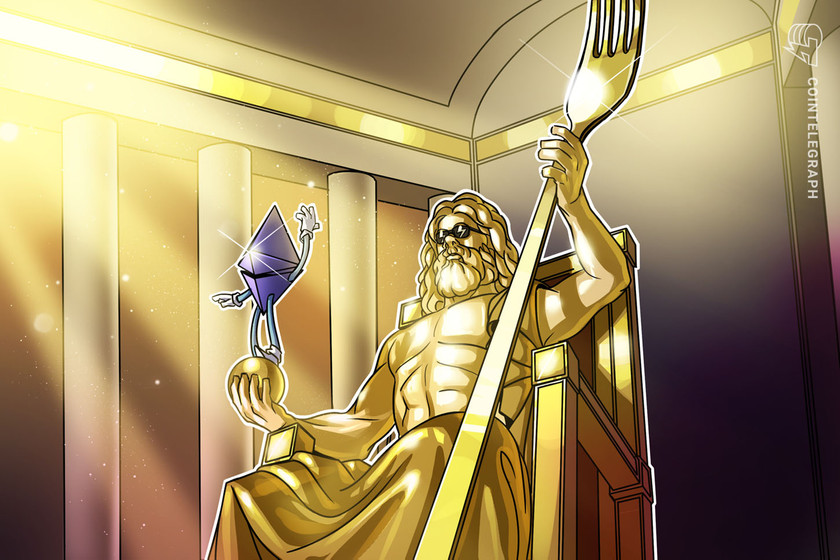
Eter (ETH) hodlers that don’t play their cards right following the Ethereum Merge may be in for a hefty bill come tax time, according to tax experts.
Around Sept. 15, the Ethereum blockchain is set to transition from its current iş kanıtı (PoW) consensus mechanism to proof-of-stake (PoS), aimed at improving the network’s impact on the environment.
There is a chance that The Merge will result in a contentious hard fork, which will cause ETH holders to receive duplicate units of hard-forked Ethereum tokens, similar to what happened when the Ethereum and Ethereum Classic hard fork occurred in 2016.
Tax compliance firm TaxBit head of government solutions, Miles Fuller, told Cointelegraph that the Merge raises some interesting tax implications in the case that a hard fork occurs, stating:
“Vergi açısından en büyük soru, Birleşmenin zincirleri ayıran bir hard fork ile sonuçlanıp sonuçlanmayacağıdır.”
Fuller, mevcut PoW ETH'nin yeni PoS ETH haline geleceğini ve herkesin mutlu bir şekilde yoluna devam edeceğini belirterek, "Olmazsa, o zaman gerçekten hiçbir vergi etkisi olmaz" diye açıkladı.
However, should a hard fork occur, meaning ETH holders are sent duplicate PoW tokens, then a variety of tax impacts may fall out “depending on how well supported the PoW ETH chain is” and where the ETH is held when the fork occurs.
For ETH held in user-owned on-chain wallets, Fuller points to IRS guidance stating that any new PoW ETH tokens would be regarded as income and will be valued at the time the user came in possession of the tokens.
Fuller explained the situation may be different for ETH held in custodial wallets, such as exchanges, depending on whether the platform decides to support the forked PoW ETH chain, noting:
"Koruyucuların ve borsaların çatalları nasıl ele aldığı genellikle hesap sözleşmenizde yer alır, bu nedenle emin değilseniz okumalısınız."
“Eğer emanetçi veya borsa, çatallı zinciri desteklemiyorsa, muhtemelen herhangi bir geliriniz yoktur (ve bir bedavayı kaçırmış olabilirsiniz). Olası bir zincir ayırma çatalından kaynaklanan herhangi bir madeni para (veya jeton) aldığınızdan emin olmak için varlıklarınızı Birleştirme öncesi barındırılmayan bir cüzdana taşıyarak bunu önleyebilirsiniz” diye açıkladı.
The performance of the PoW token can also impact the potential tax bill, according to a Wednesday Twitter post from CoinLedger director of strategy Miles Brooks:
“Tokenlerin değeri PoW çatalından sonra (ve onlar üzerinde kontrol sahibi olduktan sonra) ciddi şekilde düşerse – ki bu büyük olasılıkla – ödemeniz gereken bir vergi faturanız olabilir, ancak potansiyel olarak bunu ödemek için yeterli varlığınız olmayabilir.”
Brooks suggested it may be in an investor’s best interests to sell some of the tokens upon receiving the forked coin, which can ensure that at least the tax bill is covered.
7/ Hazırlanmak için ne yapabilirsiniz? Bir ETH PoW çatalı gerçekleşirse, çatal için uygun olup olmadığınızı bilmek isteyeceksiniz, çünkü bu tokenlardan bazılarını aldığınızda satmak sizin yararınıza olabilir. vergi makbuzu!
— CoinLedger (@CoinLedger) Ağustos 30, 2022
There has been a growing push by Ethereum miners and some exchanges for a PoW hard fork to occur, as without a hard fork these miners will be forced to move to another PoW cryptocurrency.
Vitalik Buterin suggested at the 5th Ethereum Community Conference held in July that these miners could instead go back to Ethereum Classic.
İlgili: Ethereum PoW hard fork tokenlerinin ilgi görmemesinin 3 nedeni
Contrary to what is önerilen in the associated CoinLedger göre, the post-merge Ethereum will not be called ETH 2.0 but simply ETH or ETHS, with any potential forked token referred to as ETHW.
Crypto investors should be wary of any tokens that claim to be ETH 2.0 post-Merge.
The cryptocurrency exchange Poloniex, which claims it was the first exchange to support both Ethereum and Ethereum Classic, has given its support to a hard fork and has already added trading for ETHW.
Cryptocurrency exchange Bybit told Cointelegraph that in the event of forked tokens, Bybit’s risk management and security teams have criteria in place to determine whether a PoW token would be listed on their exchange.
Bybit claims that exchanges already listing ETHW tokens are putting profits over user safety, and caution traders against moving their ETH to exchanges that are supporting the PoW tokens due to volatility and security risks:
“We caution traders that the potential Ethereum PoW forks may be extremely volatile and entail increased security risks. Exchanges that are already listing tokens for potential PoW forks are putting profits over user safety.”
Source: https://cointelegraph.com/news/ethereum-merge-and-the-hefty-tax-bill-you-could-be-in-for